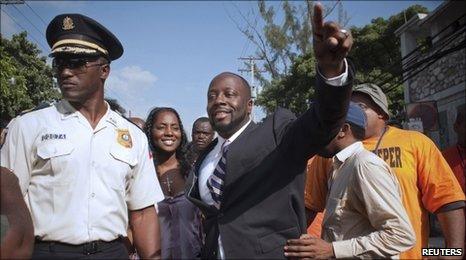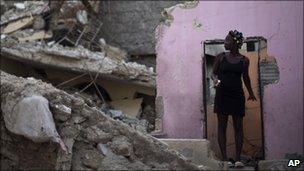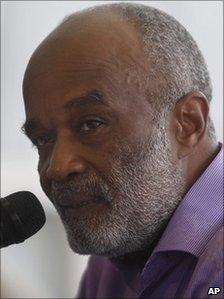Crowded race for Haiti presidency
- Published

Mr Jean is expected to gain a lot of support from younger voters
Hip-hop singer Wyclef Jean is one of the frontrunners among the many who have registered for the Haitian presidential elections due to be held on 28 November.
Mr Jean, who became internationally famous with the group The Fugees, was born 37 years ago in the Haitian town of Croix-des-Bouquet, although he left for the US as a child.
Registering his candidacy on Thursday in the Haitian capital, Port-au-Prince, Mr Jean stressed he was not the candidate of Haiti's diaspora, and felt completely Haitian.
"I have my electoral card and voted in the last elections five years ago," he told reporters.
He will not be the only singer in the race.
Michel Martelly, known as Sweet Micky, is famous in Haiti and is to stand for the Repons Peyizan (Peasants' Response) grouping.
Like Mr Jean, he insists that the main challenges facing Haiti, apart from reconstruction after this year's devastating earthquake in which about 230,000 people died, are to educate its youth and to improve the health system.

More than a million people were left homeless by the earthquake
Meanwhile, the governing Inite (Unity) party sprung a last-minute surprise; before registration ended on Saturday, they chose Jude Celestin, head of the government's main construction company, instead of endorsing former Prime Minister Jacques Edouard Alexis.
The chairman of the Inite party Joseph Lambert gave no reason for the refusal to back Mr Alexis - who immediately announced he would stand for a different party, the Mobilization for Haitian Progress.
Among the other candidates for the presidency is another former prime minister, Yvon Neptune. As the last head of government under President Jean-Bertrand Aristide, who was ousted in 2004, he hopes to win the backing of the many supporters of Aristide's Lavalas movement.
Other candidates include the mayors of several Port-au-Prince neighbourhoods, and Leslie Voltaire, the present government's reconstruction planning minister.
Observers in Haiti have criticised the calling of these presidential and legislative elections in November with more than a million Haitians still living in camps and temporary shelters.
Little of the rubble has been cleared from the capital Port-au-Prince and other stricken cities, and normal life is only slowly returning to the streets.
The headquarters of the Provisional Electoral Council was destroyed in the 12 January earthquake, and one-fifth of the officials charged with supervising elections were either killed or missing.
But the international community has insisted that the elections go ahead as scheduled. Donors have been reluctant to disburse the $5.3bn (3.2bn) pledged to help relief and reconstruction efforts in Haiti until President Rene Preval has left office.

Rene Preval has been criticised over his handling of the earthquake crisis
Mr Preval, who is barred by the constitution from standing again in these elections, has seen his popularity slide because of a perceived lack of leadership in the wake of January's earthquake.
The US has directly criticised his performance.
Richard Lugar, the senior Republican senator on the Senate Foreign Relations Committee, has written: "President Preval's actions do not suggest a departure from the self-destructive political behaviour that has kept Haiti the poorest country in the Western Hemisphere."
At first, Mr Preval appeared reluctant to leave power before next year, but at a press conference in July he told reporters: "It is vital for me when I leave there is an elected president, an elected parliament."
In addition to the presidential contest, legislative elections will be held to replace all of the 99-member Chamber of Deputies and one third of Haiti's senate seats.
Preparation for the polls is being carried out with the help of the regional Organization of American States.
OAS Secretary-General Jose Miguel Insulza has expressed confidence that, despite the massive disruption due to the earthquake, more than four million new electoral cards can be handed out.
Mr Insulza told a donor meeting in early June that the OAS would be working with the UN and Haitian officials to make sure the vote is conducted smoothly.
Some 150 observers from the OAS and the Caribbean community group Caricom are expected to observe the election.
- Published4 August 2010
- Published6 August 2010
- Published12 July 2010